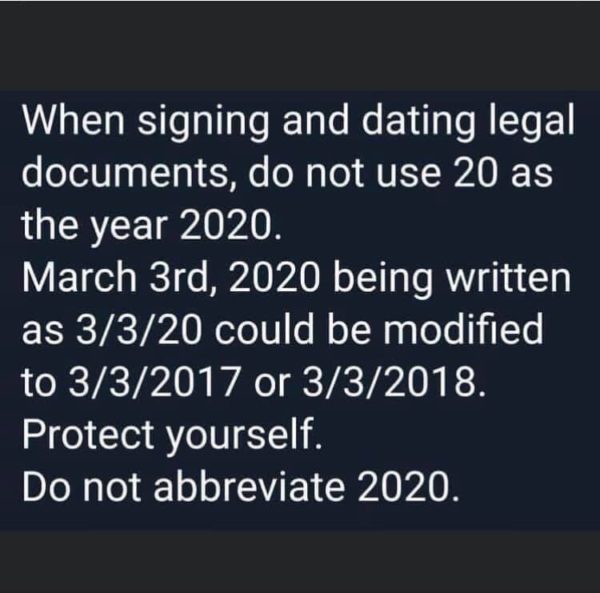
- Details
- By Levi Rickert
GRAND RAPIDS, Mich. — As you get into the habit of writing the new year on a legal document, including your personal checks, you should write out "2020" completely. Many are used to simply only using the two last digits of the year to legal documents, such a "12/31/19."
This year's abbreviation is too easily changable for some unscrupulous person and could leave you vulnerable to fraud. For instance, a scammer could easily change a document you dated for "1/23/20" to "1/23/2021."
Only using the last two digits of the year could cost you a lot, law enforcement and other experts say.
"Say you agreed to make payments beginning on '1/15/20.' The bad guy could theoretically establish that you began owing your obligation on '1/15/2019,' and try to collect additional $$$," Ira Rheingold, executive director of the National Association of Consumer Advocates, told USA Today via an email earlier this week.
While most people are honest and would never think to alter a check or other legal document, “an ounce of prevention is worth a pound of cure." Writing out "2020" entirely may save you in the end.
More Stories Like This
American Basketball Association Announces Native ABA InitiativeFour Winds South Bend Upgrades to Class III Gaming Casino
Native News Online Wins Two Awards from Native American Journalists Association
Wahlberg Brothers Are a Big Hit at Indian Gaming Tradeshow and Convention in Las Vegas
Native Gro Offers Tribes a ‘One-Stop Shop’ for Entering the Cannabis Industry
Help us defend tribal sovereignty.
At Native News Online, our mission is rooted in telling the stories that strengthen sovereignty and uplift Indigenous voices — not just at year’s end, but every single day.
Because of your generosity last year, we were able to keep our reporters on the ground in tribal communities, at national gatherings and in the halls of Congress — covering the issues that matter most to Indian Country: sovereignty, culture, education, health and economic opportunity.
That support sustained us through a tough year in 2025. Now, as we look to the year ahead, we need your help right now to ensure warrior journalism remains strong — reporting that defends tribal sovereignty, amplifies Native truth, and holds power accountable.
 The stakes couldn't be higher. Your support keeps Native voices heard, Native stories told and Native sovereignty defended.
The stakes couldn't be higher. Your support keeps Native voices heard, Native stories told and Native sovereignty defended.
Stand with Warrior Journalism today.
Levi Rickert (Potawatomi), Editor & Publisher

